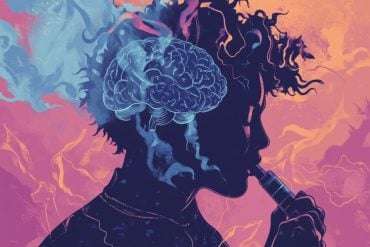Summary: A new slow-release ketamine tablet has shown potential in treating severe depression, offering a convenient and safe at-home alternative to existing treatments. In a randomized-controlled trial, patients on the highest dose of ketamine saw significant reductions in depression symptoms compared to placebo.
The tablet form avoids the dissociative effects associated with other ketamine treatments. Further research is needed to confirm these findings and achieve clinical approval.
Key Facts:
- Convenient Treatment: The tablet can be taken at home without medical supervision.
- Effective Results: Highest dose reduced depression symptoms by 14 points on the MADRS scale.
- No Dissociative Effects: The slow-release form avoids the altered reality experiences of other ketamine treatments.
Source: University of New South Wales
A new tablet form of ketamine has shown promise in treating severe depression, offering a potential alternative to existing clinic-based treatments that can be expensive and lacking in convenience for some patients.
Unlike the injectable and nasal spray alternatives that require clinicians to monitor patients for two hours while side effects subside, the slow-release tablet form can be taken safely at home without medical supervision and with negligible side effects.

Led by Professor Paul Glue of University of Otago, researchers from UNSW Sydney and the affiliated Black Dog Institute (BDI) collaborated with colleagues from other research institutions in Australia and New Zealand to run a randomised-controlled trial testing the effectiveness of ketamine tablets to treat depression compared with placebo.
The researchers randomly assigned 168 patients with treatment-resistant depression to one of five groups: four that received different strengths of ketamine, and one that received placebo.
Patients on the strongest dose of ketamine – at 180mg, taken orally twice a week – had the best results when compared to placebo, the researchers found. Success was measured by the size of reduction in a patient’s MADRS score – a measure of depression symptoms, where the higher the score, the more serious the depression.
In the 180mg group, the average reduction in MADRS score dropped by 14 points from a high of 30. In the placebo group, the average reduction was 8 points. All of the remaining doses of ketamine (120mg, 60mg and 30mg) had slightly better outcomes than placebo.
The results were published today in Nature Medicine.
Fascinating results
Professor Colleen Loo, who is clinical psychiatrist and researcher with UNSW and BDI, has previously contributed to research on the injectable and nasal spray versions of ketamine treatment for depression.
“The kind of results we’re seeing look as good as other ways of giving ketamine, and are fascinating for two reasons,” she says.
“First of all, there’s the practical clinical reason that this is a way of administering ketamine to treat depression that’s much easier to give. Rather than having to come to the clinic and have an injection and have medical monitoring for two hours, once or twice a week, this is much more convenient and allows patients to have their treatment at home, making it as convenient as other antidepressant medications.
“It is also possible that some people may respond to one approach to treatment, such as the tablet, while others respond to another, such as the injection, so having more treatment approaches is very useful.”
The second reason is that it challenges some beliefs about how ketamine works in helping people successfully overcome depression.
“There’s one school of thought that says what we call dissociative effects – where you’re feeling a kind of altered reality and perception – are actually integral to the ability to improve the depression with ketamine,” Prof. Loo says.
“And that’s very similar to the psychedelic assisted therapy model that says changing your brain circuit functioning in that very profound way gives you new insights that help you to break out of your way of thinking, and that this acute kind of dissociative altered reality experience is necessary for you to improve.
“But with this tablet form you don’t experience that because only a tiny amount is released into the bloodstream at a time, with ongoing slow release over days, and you don’t experience the dissociation at all, and yet people are improving.
“So it could be that the theory that you must have these altered reality perceptions to improve may not be correct.”
Further research needed
The double-blind trial – where the allotment of ketamine or placebo to each group was hidden from both trial administrators and participants – was the first to measure the effectiveness of a slow-release tablet form of ketamine to treat depression. But it is likely years away, and more millions of dollars spent on further trials before it becomes an approved clinical treatment.
“Douglas Pharmaceuticals, which is the New Zealand company that has produced the drug, still needs to do further studies, and it’s important to note this is not yet approved by the FDA in the US or the TGA here in Australia.
“But if it does get through all those hoops and becomes an approved treatment, it certainly makes it much more convenient, not to mention cheaper, to use ketamine to treat severe depression.”
The next step, says Prof. Loo, is for the group to run similar studies in multiple sites around the world in larger numbers of patients to show that the results are reproducible.
One such study could look at how the tablet form of ketamine compares with other modes of delivery such as injection, which to date has shown strong results.
About this depression and psychopharmacology research news
Author: Lachlan Gilbert
Source: University of New South Wales
Contact: Lachlan Gilbert – University of New South Wales
Image: The image is credited to Neuroscience News
Original Research: Open access.
“Extended-release ketamine tablets for treatment-resistant depression: a randomized placebo-controlled phase 2 trial” by Colleen Loo et al. Nature Medicine
Abstract
Extended-release ketamine tablets for treatment-resistant depression: a randomized placebo-controlled phase 2 trial
Ketamine has rapid-onset antidepressant activity in patients with treatment-resistant major depression (TRD). The safety and tolerability of racemic ketamine may be improved if given orally, as an extended-release tablet (R-107), compared with other routes of administration.
In this phase 2 multicenter clinical trial, male and female adult patients with TRD and Montgomery–Asberg Depression Rating Scale (MADRS) scores ≥20 received open-label R-107 tablets 120 mg per day for 5 days and were assessed on day 8 (enrichment phase).
On day 8, responders (MADRS scores ≤12 and reduction ≥50%) were randomized on a 1:1:1:1:1 basis to receive double-blind R-107 doses of 30, 60, 120 or 180 mg, or placebo, twice weekly for a further 12 weeks. Nonresponders on day 8 exited the study.
The primary endpoint was least square mean change in MADRS for each active treatment compared with placebo at 13 weeks, starting with the 180 mg dose, using a fixed sequence step-down closed test procedure.
Between May 2019 and August 2021, 329 individuals were screened for eligibility, 231 entered the open-label enrichment phase (days 1–8) and 168 responders were randomized to double-blind treatment.
The primary objective was met; the least square mean difference of MADRS score for the 180 mg tablet group and placebo was −6.1 (95% confidence interval 1.0 to 11.16, P = 0.019) at 13 weeks. Relapse rates during double-blind treatment showed a dose response from 70.6% for placebo to 42.9% for 180 mg.
Tolerability was excellent, with no changes in blood pressure, minimal reports of sedation and minimal dissociation. The most common adverse events were headache, dizziness and anxiety.
During the randomized phase of the study, most patient dosing occurred at home. R-107 tablets were effective, safe and well tolerated in a patient population with TRD, enriched for initial response to R-107 tablets.
ClinicalTrials.gov registration: ACTRN12618001042235.






